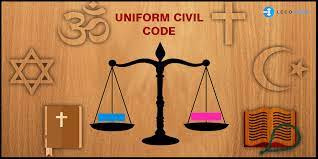Uniform Civil Code will be implemented in the country soon! These big changes will happen after the implementation of UCC, know what will happen to personal law?

The Law Commission of India has issued a notice on the Uniform Civil Code (UCC). Through this, comments and suggestions have been sought on UCC. Five years back in 2018 also some such questions were issued by the 21st Law Commission. Uniform Civil Code has been a contentious issue in Indian politics for a long time and has been included as a principle in the Indian Constitution. Former Law Minister Rijiju has said that Uniform Civil Code has been a part of BJP’s manifesto for 1998 and 2019 elections.
In November 2019, Narayan Lal Panchariya introduced a bill in Parliament to introduce it, but it had to be withdrawn due to opposition opposition. The bill came again in March 2020, but it was not presented in the Parliament. Petitions have also been filed before the Supreme Court seeking uniformity in laws relating to marriage, divorce, adoption and succession. Learn what changes will happen after the Uniform Civil Code is implemented…
These laws related to marriage will be affected
- Hindu marriage act
- Christian marriage act
- Parsi Marriage Act
- Special marriage act
- Arya Samaj Marriage Act
- Marriage according to private tradition
- Rules will be same for people of all religions
- Divorce provision will be same for all religions
- Succession law to be made equal for all religions
- Adoption laws will be same for all religions
- Guardian and wards law will apply equally to all religions
The law of distribution of land and property will apply to all religions
Personal laws of all religions will become ineffective in these areas.
In case of marriage, divorce, maintenance, property rights, adoption and succession, succession law will not apply
These changes will happen when UCC is implemented
- Equal treatment for all religions on marriage.
- The number of marriages will be fixed i.e. only one.
- Personal law will ban polygamy.
- Marriage registration is mandatory for all the couples.
- Same system for divorce for all religions.
- In divorce, the provisions and rules will be same for both the parties.
- Divorce will be restricted under personal law. For example, Muslims have Talaq-e-Bain, Talaq-e-Hasan, Talaq-e-Ahsan and Halala, while Talaq-e-Biddat i.e. triple talaq has already been declared illegal by the Supreme Court.
- Uniform arrangement on maintenance and rights of married women.
- Classification of guardianship of divorcing couples or guardianship of children in case of death of a parent.
- The minimum age of marriage for girls of all religions will be equal to 18 years. In Muslim religion, girls get married when they attain puberty, while the age of marriage for girls is 18 years.
- Gender equality will be brought on property. That is, in all religions, apart from the son, the daughter (married or unmarried) will be equally entitled to the earning property and inheritance property of the parents. While on the death of the son, his widowed wife will have the right. In Muslim religion, women do not have any right on property.
- The adoption process will be simplified for couples of all religions.
- In the presence of a will, it would be clear that the succession law would not apply.
When will the Center take the first step?
The Central Government will take its step on UCC only after the Law Commission’s report comes. By the second week of next month, the Law Commission will receive suggestions from religious organizations and general public through email. She will discuss them with experts in religion, society and constitution. After this, all the members of the commission will review each suggestion and then a report will be prepared. After preparing the report, the Law Commission will submit the report to the Law Ministry. Will make it public as well. Only after this the government will proceed on UCC.




